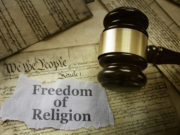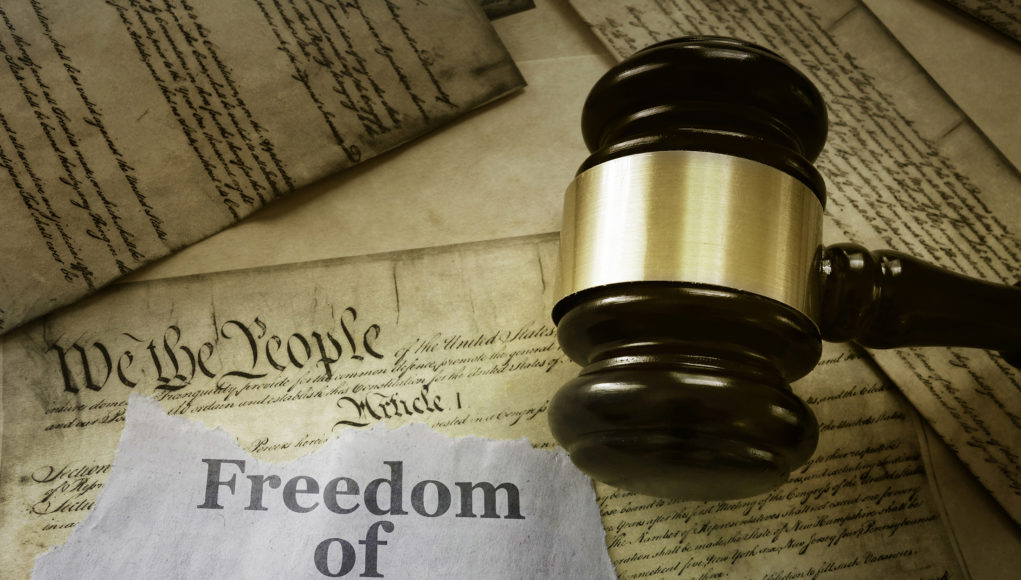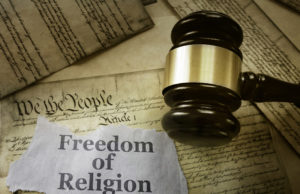The First Amendment to the U.S. Constitution makes it very clear that we are all guaranteed the natural right to practice our religious faith. Contrary to what some people seem to think, however, religious freedom doesn’t just mean the “right to worship” or the “right to go to Church.” Sure, those things are important components of religious freedom, but that’s not all.
The First Amendment expressly forbids the government from “prohibiting the free exercise [of religion]; or abridging the freedom of speech, or of the press; or the right of the people peaceably to assemble, and to petition the Government for a redress of grievances.” This means Americans are entitled to exercise their religious faith in a number of ways. Let’s consider three big ways this happens.
Church and the Public Square: No one will deny that the First Amendment protects your right to attend church or synagogue and to select the one that best fits you and your family. In fact, this is unanimously understood – but it doesn’t just stop there. What happens inside the church, and in connection with it, is just as important as your right to attend a church service.
The First Amendment’s protection for religious practice and free speech ensure that pastors don’t need to screen their sermons with the government. Pastors must be able to freely teach their holy books as they or their church determine. The First Amendment also protects the right of pastors and their congregations to engage in debates and discussions about important social and cultural issues in the public square. It also ensures that churches can follow their teachings in day-to-day affairs and publicly pronounce it.
This is critical. As John Adams once said, “Our Constitution was made only for a moral and religious people. It is wholly inadequate to the government of any other.” If the government interferes in the church’s work in the public square, our society will suffer.
Freedom of Conscience: Just as the First Amendment guarantees the right of the church to engage in important cultural debates, the religious freedom of businesses and individuals necessarily means they have the right to live and work in ways that don’t violate their conscience. In other words, the government cannot censor individuals or force them to do things they consider to be morally wrong.
Unfortunately, our freedom of conscience against government force is constantly under attack today. This is especially so in the area of artistic businesses. In recent years, cake artists, florists, graphic designers, and others have found themselves facing state laws and regulations that force them to create works of art that express messages that are counter to their beliefs.
Organizations like Alliance Defending Freedom (ADF) have represented and continue to support many clients in their stands for freedom of conscience, including the notable case of Jack Phillips. Phillips owns Masterpiece Cakeshop in Lakewood, Colorado. When a same-sex couple requested a special cake celebrating a wedding ceremony, Phillips politely refused. While he was always willing to serve any customer, he couldn’t express messages that violate his religious beliefs – from same-sex weddings to Halloween celebrations.
The Colorado Civil Rights Commission came down hard on Masterpiece Cakeshop, leading ADF to support Phillips in a legal battle all the way to the U.S. Supreme Court (SCOUTS). SCOTUS ultimately ruled that the Commission had gone too far in targeting Phillips. Cases like this one should remind every business owner about just how important artistic expression really is.
As ADF attorney Kate Anderson said, “I know from talking to my mom and from talking to clients, how personal creative expression is. It’s coming from your very heart and everything that you are.”
K-12 Schools: In addition to protecting religious freedom, the First Amendment also decrees that government “shall make no law respecting an establishment of religion.” Many people incorrectly think this means government-run schools should be utterly void of religion and religious expression. This is false.
No matter the social pressures, students must never fear expressing their faith for fear of their school shutting them down. Children have the right to pray in school, write about God in a class essay, start and join religious clubs on campus, and speak about or evangelize their faith with their peers. Likewise, parents have the right to pull their kids from classes or curriculum that defies your family’s religious beliefs or to move their children to another school environment that best suits their needs, including in a religious context.














